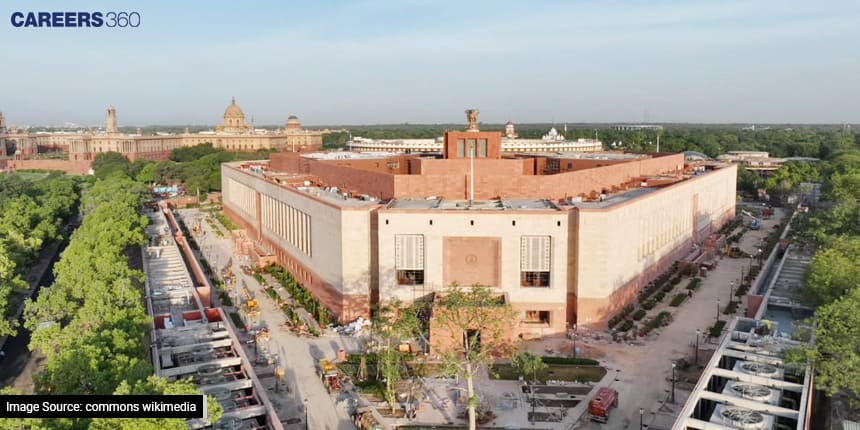Diverse Career Paths You Can Pursue At The Indian Parliament
The corridors of power within the Indian Parliament setting are the offices of India’s topmost lawmakers, but they are not limited to elected representatives alone. Behind the scenes, a diverse tapestry of professionals contributes to the smooth functioning of the democratic machinery.
Working at the Indian Parliament is prestigious and can be categorised into distinct departments, each playing a crucial role in the functioning of the legislative body. This article aims to serve as a guiding light for students aspiring to build a career within the parliamentary ecosystem. Let's explore what roles and profiles help in keeping the day-to-day functioning of our temple of democracy going..

Also Check- Top Career Options For A Political Science Major
Civil Services
Civil services within the Parliament involve administrative roles, policy formulation, and implementation. Civil servants in parliamentary settings may hold positions such as clerks, secretaries, administrative officers, and protocol officers. From legislative assistants to research analysts, civil services positions in Parliament demand a keen understanding of governance, legal frameworks, and public policy. Legislative assistants aid lawmakers by conducting research, drafting speeches, and analysing policy proposals.
Eligibility Criteria: A bachelor's degree in law, political science, or a related field is often a prerequisite. Competitive exams and interviews are standard selection procedures.
Salary Details: Salaries vary based on experience and position, ranging from entry-level positions at Rs. 50,000 per month to senior roles with six-figure monthly incomes.
Civil service roles offer a direct involvement in shaping legislation, providing a platform for policy enthusiasts to contribute to the nation's governance.
Public Relations Officers (PROs)
PROs act as the liaisons between Parliament and the public, disseminating information, managing media relations, and crafting communication strategies.
Eligibility Criteria: A bachelor's or master's degree in communication, journalism, or a related field is typically required. Strong communication skills and media management expertise are crucial.
Salary Details: Salaries for PROs range from Rs. 40,000 to Rs. 80,000 per month, depending on experience and the parliamentary department.
Working as a PRO provides a front-row seat to national events, offering the chance to shape public perceptions and influence discourse.
Media Officers
Media officers within Parliament facilitate communication between lawmakers and the press. They draft press releases, organise press conferences, and manage media inquiries.
Eligibility Criteria: A degree in journalism, mass communication, or a related field is typically required. Previous experience in media relations is advantageous.
Salary Details: Media officers can earn between Rs. 50,000 to Rs. 70,000 per month, with additional perks.
This role provides an opportunity to be at the nexus of politics and media, contributing to transparent communication and bridging the gap between Parliament and the public.
Security Personnel
Security personnel within Parliament are responsible for ensuring the safety of lawmakers, staff, and visitors. Roles range from entry-level security guards to senior security officers.
Eligibility Criteria: Educational requirements vary, with a focus on physical fitness and security training. Background checks are stringent.
Salary Details: Salaries start from Rs. 25,000 for entry-level positions and can go up to Rs. 60,000 or more for experienced officers.
Serving in a security role offers a sense of duty and responsibility, contributing directly to the safety of the democratic process.
Peripheral Roles
Peripheral roles encompass administrative staff, IT professionals, librarians, and support staff crucial for the smooth functioning of Parliament.
Eligibility Criteria: Qualifications vary based on specific roles, ranging from basic education requirements to specialised skills.
Salary Details: Salaries vary widely based on the nature of the role, with administrative staff earning between Rs. 30,000 to Rs. 50,000 per month.
These roles provide a diverse array of opportunities for individuals with varied skill sets, contributing indirectly to the effective functioning of Parliament.
Also Read | 8 Promising Careers That Don’t Require A College Degree
Research and Policy Analysts
Analysts in this category work on researching and analysing policy issues relevant to parliamentary proceedings.
Responsibilities: Conducting research, preparing reports, providing lawmakers with information on policy matters, and contributing to the legislative process.
Salary Details: Salaries commensurate with experience, often with additional benefits.
Eligibility Criteria: A strong academic background in political science, public policy, law, or a related field is typically required. Advanced degrees may be preferred for higher-level positions.
Embarking on a career within the Indian Parliament campus opens doors to a spectrum of roles, each contributing uniquely to the democratic process. Whether one aspires to be a legislative assistant shaping policies or a media officer fostering transparency, the opportunities are diverse and impactful.
Also Read | 10 Important Career Tips For College Students